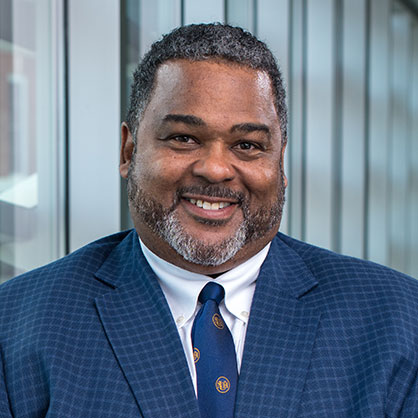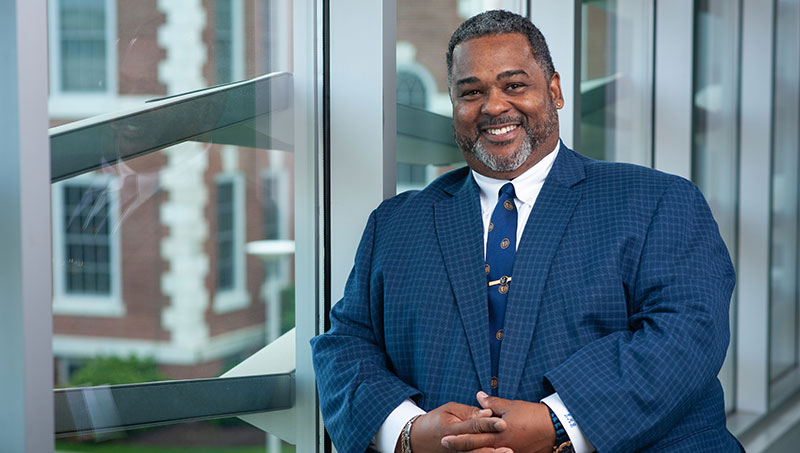Ph.D. Northeastern University
M.A. University of Massachusetts Boston
B.A. University of Massachusetts
Lorenzo M. Boyd, Ph.D., is a nationally recognized leader in police-community relations and an authority on urban policing, diversity issues in criminal justice, race and crime, and criminal justice systems.
He served for 14 years in the Suffolk County (Mass.) Sheriff’s department – working in policing, corrections, and the courts – which he says shaped his approach to teaching, research, and training of police commanders and officers.
As the former director of the University’s Center for Advanced Policing, Dr. Boyd built the center into a national resource for professional development, with a central focus on building levels of empathy and cultural competence among police leaders and officers. He reached out to commanders, chiefs, and police leadership around the region and the country to determine what their departments’ training needs are, and he developed interactive professional development with real-life scenarios and role playing.
In 2022, he helped the University secure a $1 million grant from the Department of Justice’s Community Oriented Policing Services (COPS Office) supporting a de-escalation training program that will be offered for police departments across the Northeast. The University is one of only six regional de-escalation training centers across the country that provides law enforcement training that is approved by the Department of Justice.
In September 2021, after serving as the University’s vice president for diversity and inclusion and chief diversity officer, he was named the inaugural holder of the Stewart Professorship in Criminal Justice and Community Policing.
A former president of the Academy of Criminal Justice Science and a life member of the National Organization of Black Law Enforcement Executives (NOBLE), Dr. Boyd has appeared on local, regional, and national media outlets to discuss policing in the aftermath of high-profile cases, including shootings in Baton Rouge, Dallas, and Ferguson, Missouri. In 2019, he led a study addressing issues of racism, bias, and police and community relations at Yale University after a white graduate student called the police to report a black graduate student who was asleep in a residence hall common room.
Dr. Boyd has taught at the university level for 20 years. Prior to joining the University of New Haven in 2019, he was associate professor and chair of the departments of Criminal Justice and Social Sciences at the University of Maryland Eastern Shore in Princess Anne, M.D. He previously was the master’s program coordinator for the University of Massachusetts Lowell’s School of Criminology & Justice Studies.
While working as an associate professor and graduate coordinator of criminal justice at Fayetteville State University in Fayetteville, N.C., the city’s police chief asked him to create a community-policing program. After observing the community’s high levels of unemployment, drug use, and transience, and lack of afterschool programs, Dr. Boyd recommended the city first develop a community-wellness program.
As an adviser to the Fayetteville police chief for eight years, he worked with city agencies to make numerous improvements and held community-police forums where residents could talk about complaints including concerns about racial profiling, and police officers could share their own experiences. He then created a community-policing program that included training modules for sworn and non-sworn personnel on topics including ethics and leadership; researched and developed new evidence-based policing strategies; and assisted with officer recruitment.
Widely published, he recently authored the book, Massachusetts's Criminal Justice System. His book chapters include "Black Lives Matter: The Watchdog for the Criminal Justice System" in Appearance Bias and Crime, and "Does Police Discretion Help or Harm Our Criminal Justice System?" in Crime and Criminal Justice: Concepts and Controversies.
Dr. Boyd’s publications also include "Race, Geography, and Juvenile Justice: An Exploration of the Liberation Hypothesis" in Race and Justice; "Racial Disparities in Juvenile Court Outcomes: A Test of the Liberation Hypothesis" in the Journal of Ethnicity in Criminal Justice; "Light Blue vs. Dark Blue: Attitude Differences in Quality of Life Policing" in the Journal of Ethnicity in Criminal Justice, and "Minority Threat Hypothesis and the Workload Hypothesis: A community-level examination of lenient policing in high crime communities" in Criminal Justice Studies: A Critical Journal of Crime, Law and Society.
He received his Ph.D. in sociology from Northeastern University, his M.A. in applied sociology from the University of Massachusetts Boston and a B.A. in sociology from the University of Massachusetts Amherst.

